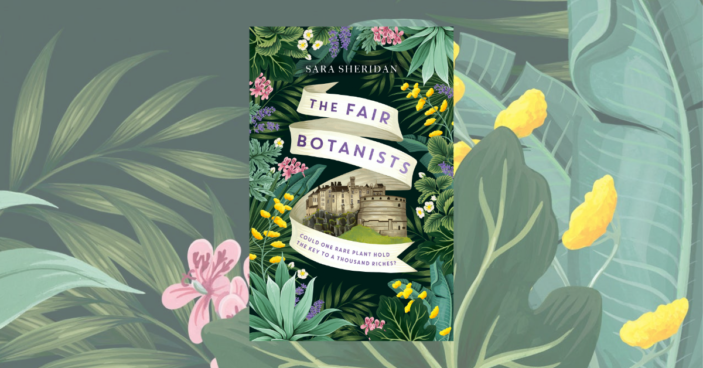
The story of how Sara Sheridan’s latest book The Fair Botanists came to be is a fascinating one. Or one to envy if you are trying to get a book published yourself. In an author’s note at the back of the novel, Sara tells of how she was eating at a restaurant when she got a text from her agent saying that she was currently with an editor and thought that Sara and this editor should meet. The agent and her editor friend were in the same restaurant as Sara, she joined them, and the book was commissioned based off the conversation that resulted.
That book, The Fair Botanists, is a historical novel set in Edinburgh in 1822. It is told largely from the points of view of two women with passing interests in botany who witness the creation of the new botanical gardens, complete with giant trees being transplanted and carried in carts down main streets. Belle Brodie, the granddaughter of a Duke, albeit an illegitimate one, makes her living as a kept woman. She is the mistress to two local men, and they pay her handsomely for it. She also has income from a half-brother whom she blackmails, and from an apothecary to whom she supplies her homemade perfumes. While she’s infamous, she’s also tough and glamorous, and takes care of her servants.
Elizabeth Rocheid, meanwhile, is an English widow who has been taken in by her late husband’s family and brought to Edinburgh to look after an ageing relative, Lady Clementina. She accepts their invitation because she has nowhere else to go, but feels like an impostor among them as her marriage to their late cousin was not a happy one, and she is pleased to be free of him. Elizabeth is talented botanical illustrator and offers her services to James McNab who is overseeing the garden, which is next door to the Rocheid estate. When she goes to the lending library for a book, and is informed that Miss Brodie currently has it, the two women meet and form a fast friendship.
There is something about The Fair Botanists that holds the reader at arms length. Told in third person present tense, at times the narrative seems to be at a distance removed from all of its characters. The language of the novel is also somewhat overly formal, presumably in an attempt to give it that historical feeling. The result however, is that it does take a while to get into the reading of it. This is a slow, character driven novel, and at times I found myself wondering if anything was ever going to happen. Thankfully, in the latter half of the book, several things do begin to happen, and the plot picks up.
Belle’s character in particular is a captivating one and I would have gratefully read more about her. What leads a courtesan to become interested in botany? How did she educate herself? What was the dynamic between her and her half-brother? Much of this is left to the imagination. So too are the many supporting characters, who all start to blend into one another – something which is not helped by the proliferation of Jameses and Jamies.
While the book has a captivating premise and some promising characters, over all it falls short of the sumptuous historical fiction that has been coming out of late. It has been compared to Jessie Burton and Imogen Hermes Gowar, but I think that comparison is more apt to the setting than the level of excitement one should expect.
With royal characters, love stories, courtesans who make potions, literary figures and a plant that only flowers once every century, it’s safe to say that I was left wanting more from this book. If you like beautiful language and slow, relaxing books with beautiful botanical details, however, then perhaps this may suit you better.
![]()
![]()
![]()
![]()
![]()
THREE STARS (OUT OF FIVE)
Sara Sheridan’s The Fair Botanists is available now from Hodder and Stoughton. Get yourself a copy from Booktopia HERE.
